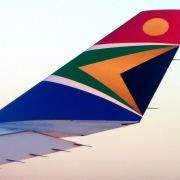New CEO for SAA – what travel agents need to know
SAA has appointed Vodacom group executive, Vuyani Jarana, as its new CEO. He will commence his duties after his current employer has officially released him.
Jarana is currently Chief Officer for Vodacom Business at Vodacom Group LTD, a position he has held since 2012. He is also a member of the core leadership team of Vodacom Group responsible for the enterprise segment across the continent.
Finance Minister Malusi Gigaba said: “Given that Jarana has turned around a loss-making subsidiary of the Vodacom Group, Vodacom Business Africa, into profitable and growth business, we believe he will be key in turning around SAA.”
What will the job of the new CEO be?
Jarana will have to slash costs, boost revenue and re-engineer the airline. He will also be implementing a long-term turnaround strategy and corporate plan which he did not formulate.
Jarana’s appointment will bring much needed stability to the executive management of the airline which has been without a permanent CEO since the departure of Monwabisi Kalawe in 2014.
What’s happening with SAA’s loan repayments?
Gigaba is leading negotiations with SAA lenders in an attempt to postpone the repayment of loans due in September. SAA had to find an additional R6.9bn to settle these loans. The loans were due for settlement in July‚ but the airline managed to convince most of the lenders to defer the payment to end September.
How much money does the airline still need from government?
In addition to the R2.2bn bail-out, SAA told the Treasury it needed R13bn over the next three years, of which R3bn will be used for working capital and R9.1bn to retire the debt that is maturing in the current financial year.
Will the government grant SAA another bailout?
Minister Gigaba will make an announcement on a bail-out in the medium-term budget review in October. Gigaba said strict conditions would be attached to the recapitalisation of the airline.
Will SAA need to cut routes?
One of the measures to cut costs at SAA is to cease operations on unprofitable routes, including the Johannesburg-Abuja route.
Briefing Parliament’s Standing Committee on Finance on August 4, SAA acting ceo, Musa Zwane, said he expects to save R900m per annum by cutting a number of routes.
What’s happening with the Preferential Procurement Regulations?
Other than the appointment of an SAA CEO, Gigaba had also undertaken to meet the deadlines set on National Treasury in the 14-point Action Plan released in July, including the implementation of the Preferential Procurement Regulations.
Implementation of the Preferential Procurement Regulations commenced on 1 April 2017 and the reference to July 2017 is linked to accelerating efforts towards inclusive growth – preferential procurement regulations are one of the policy instruments to accelerate the inclusive economic activity.











